The five major emerging economies – Brazil, Russia, India, China and South Africa (BRICS) – will meet at a summit today to discuss the possibility of a new development bank and trade agreements between the nations. Brazil in particular has risen fast in world economic standing. But the country’s rise in global affairs results from the combination of many factors, some old and some new.
With a population of 194,946,470, it’s the fifth-most populous nation in the world. It’s also the fifth-largest territory, and the sixth-largest economy.
Other factors have also spurred its growing geopolitical clout, including the restructuring of global power distribution (a declining USA and the rising of China); the growing importance of new issues on the global agenda (financial crisis, climate change, nuclear race, the Arab spring, human rights); recent successes on the domestic front (economic recovery after controlling hyperinflation, the reduction of poverty levels); and the quality of Brazilian diplomats.
Brazil has been a founding member of, and a key player in, some of the most important of today’s economic governance institutions (the UN, IMF, GATT/WTO, G20) and arrangements, such as the UN Conference on Sustainable Development, on the environment, and on human rights issues.
In the 66-year-old UN Security Council, Brazil has served ten two-year terms - the highest participation rate for non-permanent members, alongside Japan.
But as important as stating Brazil’s centrality in global decision-making is identifying the most important driving forces behind the setting of Brazil’s foreign policy goals and strategies.
Brazil is a mammoth country, sharing land borders with ten nations. The sole episode of war involving Brazil in its own region, South America, is the so-called Triple Alliance War that pitted Argentina, Brazil and Uruguay against Paraguay between 1864 and 1870. All treaties settling Brazil’s borders were the outcome of strictly political negotiations or international arbitration; not a single metre was the outcome of war.
Equally extraordinary is the fact that such a daunting record more or less resulted from the determination of a single man, José Maria da Silva Paranhos, Jr, the 1st Baron of Rio Branco.
He worked as Brazil’s Minister of Foreign Relations from 1902 to 1912 under four democratically elected presidents and was called to take part in a number of important border arbitrations in the region and beyond.
It should be noted that one of Rio Branco’s most important legacies for the country – second to the settling of the borders themselves – has been the reverence to diplomacy and a general disbelief in the use of force as a legitimate instrument in international relations.
The resolute refusal to consider the costs of not engaging the use of force in certain historical settings is the result of a normative commitment to negotiation and condemnation of violence.
Those elements were then locked in Brazil’s geography and deeply ingrained in the cultural mindset of the country’s political elites - diplomats included. The consolidation of a cultural rejection to the use of force in world affairs took place in Brazil despite the contrasting records of social and political violence that has long characterised its history.
Brazil was one of the last countries to abolish slavery. It has a long history of racial discrimination associated with high levels of social inequality and extreme poverty. Brazil has also experienced two long episodes of authoritarian rule in the 20th century, both marked by oppression of civil and political rights.
Parts of the country are refuges for organised crime, which places Brazil among the most violent societies in the Western world. That Brazilians are a “peace-loving people” is a pure cliché repeated ad nauseum by the country’s political elites in order to promote a positive image abroad.
Aside from being morally biased, this line of reasoning about international politics has originated in the idea of a Westphalian notion of sovereignty, a key concept in international politics that was made archaic and non-operational by the changes resulting from the end of the Cold War.
The Westphalian order was based on the understanding that the legitimacy of a ruler to run the affairs of her country as she feels like was recognised by her foreign counterparts. The ruler’s sovereignty in domestic affairs obfuscated all rights (individual and collective) of the country’s citizens to confront the ruler. As a result, world peace was built upon the premise that in each country, the rulers were free to settle domestic disputes over power, budget or policy through the use of brute force if deemed necessary.
Rio Branco’s historical legacies are still revered by the country’s diplomats, without the indispensable consideration of the minutiae of the time and place where they originated. When written in stone as inalienable truisms, Rio Branco’s accomplishments and beliefs misguide the decision-making process of Brazilian foreign policy, separating its unquestionable presence on the high table of world affairs from the meagre results it can provide.
Led by a fairly naive (if not schizophrenic) faith in political negotiation as the only effective instrument for establishing peace among nations, Brazil is expected to keep pressuring the international community to exhaust all available diplomatic instruments before accepting the use of force, even when the strongest party to a conflict (a ruler) brutally imposes its wills on individuals or communities.

